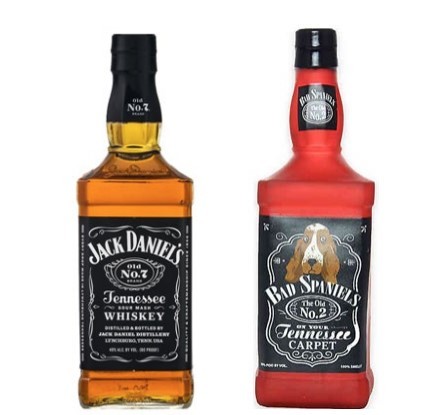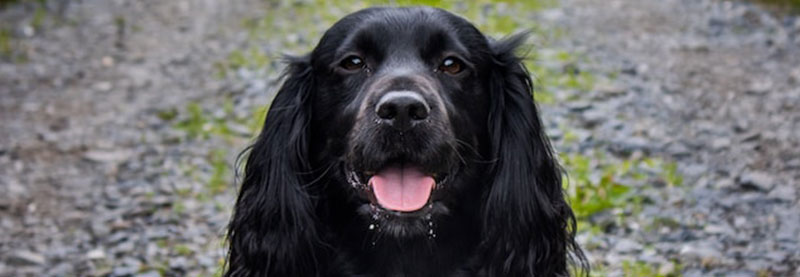Intellectual Property Insights from Fishman Stewart
Mini Article – Volume 23, Issue 6
Share on Social

Doggy Doo, Doggy Don’t: A Supreme Court Issue. (No, Really.)
When a Bad Spaniel leaves a doggy stain on a famous brand’s proverbial carpet, even the Supreme Court can have fun. Last week, in the case of Jack Daniel’s Properties, Inc. v. VIP Products LLC, the Supreme Court heard arguments from the attorneys representing Jack Daniel’s and VIP Products. At issue is a dog toy sold under the name Bad Spaniels with poop-themed jokes all over the label in parody of—or trademark infringement of—Jack Daniel’s’s trademarks.

Jack Daniel’s isn’t the only brand that got its own Silly Squeakers dog toy. VIP Products sells a line of beverage-themed pet toys, including Mountain Drool, Smella Arpaw, and Heinie Sniffin, among many others. All of the dog toys resemble the beverage bottles and cans their names call to mind, in terms of shape, color scheme, and label details.
VIP Products contends that its dog toy is a parody of the Jack Daniel’s whiskey bottle. Parody is a well-established defense to a claim of copyright infringement. The copyright laws are intended to foster creativity and to encourage artistic expression. In the context of creative works and copyright law, parody enjoys strong First Amendment protections.
A claim of parody in the trademark context, like the “Bad Spaniels” use, faces an uphill battle because the allegedly infringing use of the trademark owner’s trademark, slogan, product design, and the like are in the context of a commercial use. The trademarks (or parody thereof) are being used in association with the sale of another company’s products. This is in contrast to noncommercial use of another’s trademark for parody, such as Andy Warhol’s famed painting of the Campbell’s soup cans that included use of the Campbell’s trademark.
Will consumers buy the dog toys because they believe they are made by or endorsed by Jack Daniel’s? Will they buy the dog toys because they like the humorous take on the Jack Daniel’s label? Does the Bad Spaniels dog toy harm the Jack Daniel’s brand, or will consumers see it as an obvious funny take on the Jack Daniel’s label? Even if consumers see the obvious joke, would they nonetheless perceive it as affiliated with or sponsored by Jack Daniel’s?
The arguments before the Supreme Court yielded many laughs. Will this translate to a successful defense of parody? That remains to be seen.
Michelle Visser is a partner of Fishman Stewart, with over 25 years of experience practicing trademark law with other members of the firm’s Trademark Group. Besides going on adventures with her husband Kent, she loves attending to her two dogs, which were her inspiration for today’s article (photographed below).

Published March 31, 2023


Related Content from Fishman Stewart
People have long pondered whether or not the Giza pyramids were indeed solely burial chambers, which was the only known, and archaeologically determined, use—until now.
By 1930, efforts began in New York to replace Mother's Day with Parent's Day because men were more than just breadwinners. Those efforts didn't catch on, probably because in that era, women often spent more time in the home.
In February, Nike and Skims announced that they will be working together on a new brand, NikeSkims. The co-brand will create a new line of training apparel, footwear, and accessories specifically designed to meet the unique needs of women athletes.
Generally, federal courts have exclusive jurisdiction over copyright cases, and often, this presents an insurmountable paywall for individual artists and small businesses to vindicate their rights, especially where the value of the individual copyrighted works are relatively low.
Dedicated to raising public awareness about the importance of encouraging innovation and creativity throughout the world, the World Intellectual Property Organization (WIPO) annually observes World Intellectual Property Day on April 26 to showcase the role that patents, trademarks, industrial designs, copyrights and trade secrets play in our everyday lives.
Hold onto your foam fingers, sports fans – college sports just got a whole lot more interesting! The latest updates to Name, Image, and Likeness (NIL) rules are making student-athletes bigger than ever, and it’s not just about the game anymore.
Did a federal court in Louisiana recently decide that US copyrights are global rights? It seems so.
One of his most famous songs, “Lose Yourself” was recently at the center of a lawsuit. In 2019, Eminem’s publishing company Eight Mile Style sued Spotify claiming that Spotify streamed a number of its musical compositions without proper licenses.
One of the most common challenges is whether AI should be free to train on data that is protected by copyright and owned by third parties without first obtaining permission.
The U.S. Copyright Office (USCO) recently published its latest report on AI and “copyrightability.” In short, the USCO considers only some AI-generated works to be sufficiently creative as to deserve copyright protection, and thus, registration.
IDENTIFYING, SECURING AND ADVANCING CREATIVITY®












